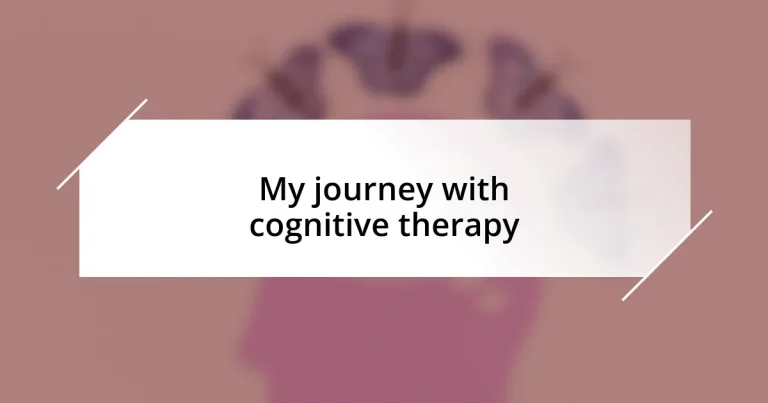Key takeaways:
- Recognition of cognitive distortions helped transform negative thinking patterns and emotional responses.
- Daily tracking of thoughts and progress facilitated accountability and clarity in the therapy journey.
- Embracing vulnerability and self-expression deepened emotional understanding and empowerment.
- Reframing thoughts transformed anxiety into self-empowerment, highlighting the importance of self-compassion.
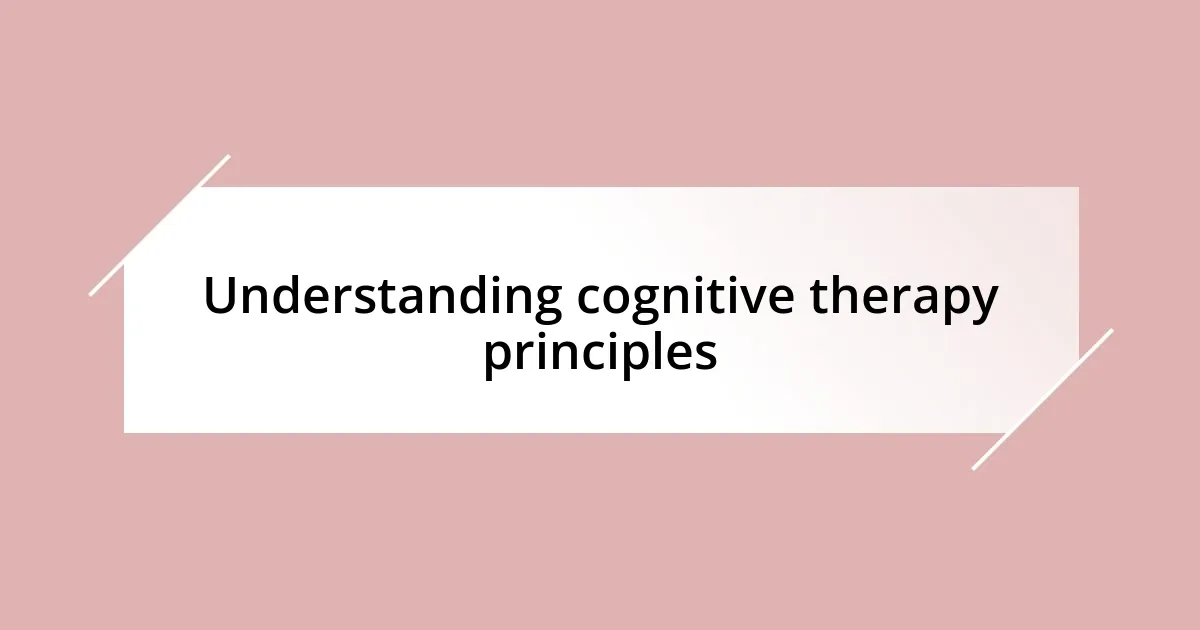
Understanding cognitive therapy principles
Cognitive therapy is built on the premise that our thoughts significantly influence our feelings and behaviors. When I first learned about this connection, it stirred something within me. Could it be true that by altering our negative thought patterns, we could change our emotional responses? This idea captivated me.
One of the core principles is the concept of cognitive distortions—misguided beliefs that can obscure our perception of reality. I remember grappling with my tendency to jump to conclusions, often assuming the worst in situations. Recognizing this pattern was like shining a light in a dark room: it revealed previously unseen paths and options.
Another key aspect is the emphasis on mindfulness and self-awareness. Practicing mindfulness helped me observe my thoughts without judgment. Have you ever paused and thought about how your mind races at times? I found that by simply observing my thoughts instead of engaging with them, I could create a space for change. It was liberating to realize that my mind didn’t have to dictate my emotional wellbeing anymore.
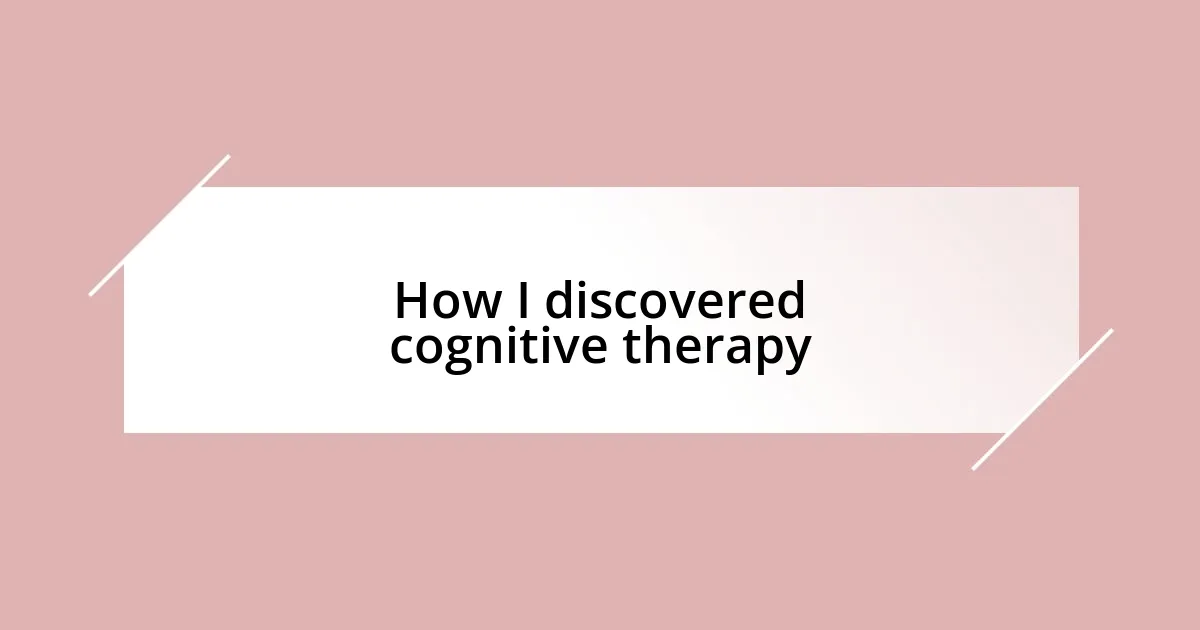
How I discovered cognitive therapy
In my quest for understanding myself better, I stumbled upon cognitive therapy during a particularly tough period in my life. It was during a lunch break at work when a colleague, noticing my unease, suggested I look into cognitive behavioral techniques. At first, I was skeptical; how could changing my thoughts lead to real change? But that spark of curiosity pushed me to dig deeper, and I quickly became absorbed in learning how our mental frameworks truly shape our reality.
Not long after that, I found myself browsing the self-help aisle of a local bookstore. I picked up a book on cognitive therapy, and as I read through the chapters, it felt like every word resonated with a personal truth. I vividly remember the exact moment when I read about the importance of challenging negative thoughts. It was as if someone turned on a light bulb in my mind. I realized that my relentless self-criticism was not a reflection of reality, but rather a cognitive distortion I had been carrying for years. This revelation was both freeing and daunting, igniting a desire in me to explore this newfound understanding further.
Reflecting on my journey, I can now see how cognitive therapy has profoundly influenced my perspective. It wasn’t just about managing anxiety; it became a pathway to a more fulfilling life. I’ve started recognizing how often I would catastrophize situations—imagining the worst possible outcomes without any grounding in reality. Each day, I practiced reframing my thoughts, gradually transforming my internal dialogue from one of fear to possibility. The process was not without its challenges, but the gradual shifts I experienced were truly empowering.
| Discovery Moment | Insight Gained |
|---|---|
| Conversation with a colleague | Curiosity about cognitive therapy sparked |
| Browsing a bookstore | Understanding cognitive distortions |
| Daily practice of reframing thoughts | Empowerment through cognitive change |
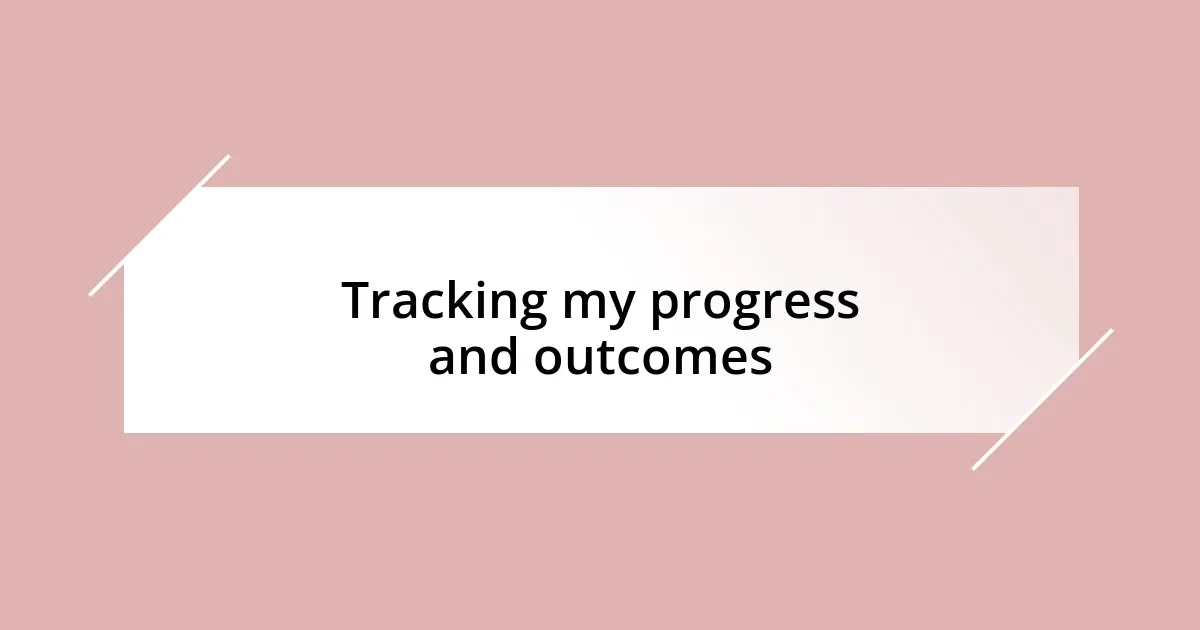
Tracking my progress and outcomes
Tracking my progress in cognitive therapy was like keeping a diary of my evolving thoughts and feelings. Initially, I feared that the changes would be too subtle to notice. But as I started documenting my daily experiences, it became clear that I was making tangible strides. I remember the first time I recognized a cognitive distortion in real-time. Instead of spiraling into negativity, I paused, noted my thoughts, and consciously reframed them. That moment felt like a personal victory, a tangible proof that the therapy was reshaping my mindset.
To keep up with my progress, I developed a simple tracking system that helped me reflect on various aspects of my mental health:
- Daily Thought Record: I logged negative thoughts and their cognitive distortions.
- Reframing Practice: I noted how I challenged each negative thought.
- Mood Ratings: I assessed my emotional state each day on a scale from 1 to 10.
- Weekly Reflections: I summarized my insights and experiences to identify patterns over time.
- Goals Setting: I set achievable goals related to my cognitive shifts and celebrated each small success.
This structured approach not only provided clarity but also instilled a sense of accountability. Watching my progress unfold was both enlightening and gratifying, painting a vivid picture of my internal transformation.
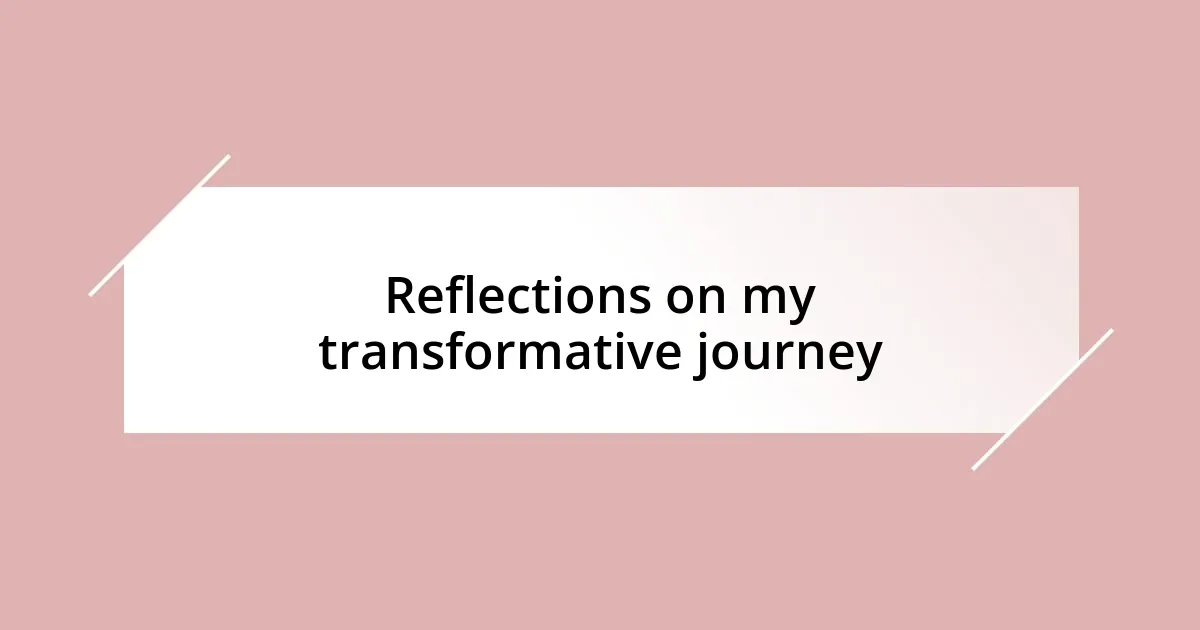
Reflections on my transformative journey
One pivotal moment in my journey was when I began to actively embrace vulnerability. I remember sitting on my couch, notebook in hand, grappling with the thought of expressing my feelings. I questioned myself: Why had I held back for so long? Letting those emotions flow onto the page felt cathartic, almost like I was unshackling myself from a heavy burden. This exercise not only deepened my understanding of my triggers but also created an intimate dialogue between my mind and heart.
As I progressed through cognitive therapy, I began to appreciate the little victories more profoundly. One day, I found myself in a situation that would typically send me into a tailspin of anxiety. Instead of succumbing to that familiar spiral, I paused and practiced reframing my thoughts: “What if I’m capable of handling this?” This shift may seem small, yet it marked a huge leap in my self-empowerment. It was as if I had come home to myself, recognizing that I could choose how to respond, rather than merely react out of fear.
Reflecting on these moments, I realize that my journey has been about more than just overcoming challenges; it’s been about rediscovering my strength. I’ve learned to celebrate the power of self-compassion, recognizing that it’s okay to take one step forward and two back sometimes. Have you ever felt overwhelmed by your emotions and wondered if you’d ever regain control? I can assure you—it’s a part of the process, and each time we choose to confront those emotions, we gain a little more clarity and a lot more courage.












